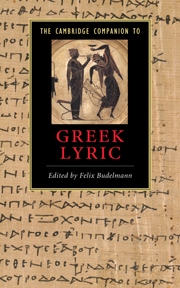Book contents
- Frontmatter
- Introducing Greek lyric
- Part I: Contexts and topics
- Part II: Poets and traditions
- 8 Iambos
- 9 Elegy: Forms, functions and communication
- 10 Alcman, Stesichorus and Ibycus
- 11 Alcaeus and Sappho
- 12 Anacreon and the Anacreontea
- 13 Simonides, Pindar and Bacchylides
- 14 Ancient Greek popular song
- 15 Timotheus the New Musician
- Part III: Reception
- Chronology of select melic, elegiac and iambic poets
- Further Reading
- Glossary
- List of works cited
- Index
14 - Ancient Greek popular song
from Part II: - Poets and traditions
Published online by Cambridge University Press: 28 May 2010
- Frontmatter
- Introducing Greek lyric
- Part I: Contexts and topics
- Part II: Poets and traditions
- 8 Iambos
- 9 Elegy: Forms, functions and communication
- 10 Alcman, Stesichorus and Ibycus
- 11 Alcaeus and Sappho
- 12 Anacreon and the Anacreontea
- 13 Simonides, Pindar and Bacchylides
- 14 Ancient Greek popular song
- 15 Timotheus the New Musician
- Part III: Reception
- Chronology of select melic, elegiac and iambic poets
- Further Reading
- Glossary
- List of works cited
- Index
Summary
Field-working scholars in the discipline of ethnomusicology have often suggested that widely endorsed and employed concepts such as 'folk song' and 'popular song' and their ideological implications may be misleading for context-sensitive and anthropological approaches to expressive culture. Viewed in terms of the socio-cultural dynamics of (especially) archaic Greece, these concepts might rather be considered as conventional classificatory terms that have been attached to ancient Greek songs for several centuries. Folk song and folk culture are marked categories that have been emphatically promoted since the eighteenth century. The aim of this chapter is not to investigate the historiography of a significant and influential concept but rather to point to ways of viewing what I shall call the interdiscursivity of 'literary' and 'popular'/'folk' songs in archaic, classical and Hellenistic Greece.
The problems with the term 'popular song' do not lie in possible associations with a post-1960s political economy of mass-media-related popular song. In the context of this chapter, carmina popularia (as 'folk/popular songs', 'game songs' and traditional 'ritual songs' are collectively labelled in Page's Poetae Melici Graeci) refer to song texts apparently stemming from - and expressing aesthetic thought patterns of - a so-called ancient vox populi ('people's voice').
- Type
- Chapter
- Information
- The Cambridge Companion to Greek Lyric , pp. 263 - 276Publisher: Cambridge University PressPrint publication year: 2009
- 6
- Cited by

